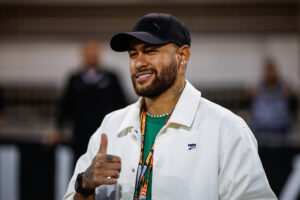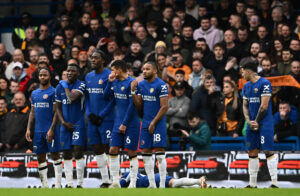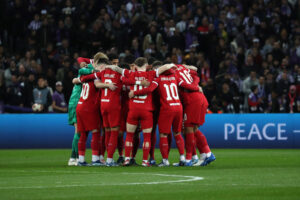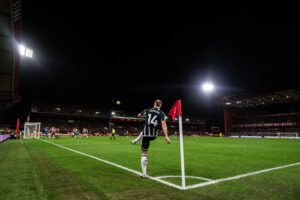Playing abroad is something that only a small percentage of British players seem to do. Even fewer seem to make a success of it, with most struggling to adapt to new culture and way of life. Out of their comfort zone, some simply freeze. This accusation could not, however, be labelled at former England captain David Platt. The goalscoring midfielder was a roaring success in Serie A in the 1990’s, when Italian football was recognised as the best league in the world.
Early Beginnings
David Platt joined Manchester United, becoming an apprentice after leaving school in 1984. Within three months he was offered a professional contract by the club, but was unable to break into the first team. The embarrassment of riches United had in midfield, with players like Bryan Robson, Remi Moses and Norman Whiteside meant that Platt did not make a single appearance. In 1985, Ron Atkinson gave him a free transfer.
Platt was not without a club for very long as Crewe Alexandra manager Dario Gradi snapped him up. He was immediately blooded into the first team, scoring five goals. A strong runner, with a good work rate and a keen eye for goal, Platt soon became a key player.
Despite having Platt in their side, Crewe were never able to achieve better than mid table finishes. By the 1986-87 season, with 22 league goals, Platt was scoring more frequently than most strikers in the division. The following campaign saw him add a further 19 strikes, and by now the bigger clubs were queueing up. In February 1988, Crewe accepted a £200,000 bid from Aston Villa, who had been relegated from Division One the previous season.
International Recognition
Just like he had at Crewe, Platt walked into the side at Villa Park, and scored five times before the season’s end. Villa finished runners-up to Millwall in the Second Division to ensure their promotion back to the top flight. In his first full season Platt was first choice for Graham Taylor, scoring fourteen times as Villa narrowly avoided relegation.
1989-90 saw a complete reversal for Villa, as they went from battling the drop to fighting for the title. Platt’s well timed runs into the box were a big factor in the club’s revival, and he scored 21 goals in all competitions. This saw him earn his first England cap under then manager Bobby Robson. Villa finished second behind champions Liverpool, and Platt earned his place in the England squad for the World Cup.
Platt was initially a squad member, on the bench for all of England’s group games. He was given only brief appearances against Ireland and Holland. England progressed to the second round against Belgium, and this is where Platt became the darling of the nation. He was sent on as a substitute for Steve McMahon, as the stalemate proceeded to extra time. It looked as though a penalty shootout was on the horizon, until England won a free kick in the last minute. Paul Gascoigne floated the ball towards goal, and Platt turned and executed a fine volley into the corner to win the game.
With Bryan Robson having suffered an achilles tendon injury, there was suddenly a space in the midfield. Platt was given his first start of the tournament against Cameroon, and he made the most of it. He opened the scoring with a header from a cross by Stuart Pearce, in a game England eventually won 3-2. In the semi-final against West Germany, Platt had a goal disallowed in extra time, which would have taken England to the final. He also scored his penalty in the shootout, although England would fall at that hurdle.
Despite the heartbreaking exit, Platt’s tournament had been a very successful one. His performances had earned rave reviews, and several scouts in Italy were keeping their eyes peeled. Platt stayed one more season at Villa Park, and scored 24 goals in total, his best tally yet. He even went in goal for one game, when Nigel Spink suffered an injury. The Italian clubs came calling, and in the summer of 1991 Platt moved to Bari for a fee of £5.5 million. At that time, the British transfer record was still £2.3 million, which shows why Villa were powerless to reject such a bid.
Bari
In the days before the Premier League, Italy was where the big money and the big players were. At that time English, indeed most European clubs, were unable to compete with the financial muscle of Serie A. It was no surprise when Platt followed in the footsteps of Mark Hateley, Ray Wilkins and Joe Jordan. The chance to earn big money and test yourself against the best players in the world would have tempted most players.
Upon arriving in Italy, he gave an interview declaring that he wanted to be the “Maradona of Bari”. When he missed a penalty in a pre-season friendly, the press set out to crucify him. In spite of this, the fans welcomed him with open arms. Compared to clubs such as Juventus and Milan, Bari were not used to the club signing such big name players. His former manager at Villa, Graham Taylor, was by now the England manager. Following the retirement of Bryan Robson from international football, Platt became England’s captain, raising his profile even higher.
What immediately marked Platt out from the crowd was his goal output. Italian football, especially back then, was seen as a defensive league, yet Platt scored 15 goals in all competitions. In addition to this, his new team spent the entire 1991-92 season battling relegation; a fight they eventually lost. When you consider that world class strikers such as Ian Rush and Hristo Stoichkov struggled to adapt to the Italian way of football, this makes his achievement even more impressive.
Juventus
With Bari relegated to Serie B, Juventus stepped in with a bid of £6.5 million to take him to Turin. His one season at the Stadio Delle Alpi was possibly one of the more frustrating of his career. With talents such as Andreas Möller, Dino Baggio, Antonio Cone and Roberto Baggio ahead of him, Platt was merely a squad player.
Platt managed just sixteen Serie A appearances in the black and white of Juventus, scoring three times. The most important of these goals was undoubtedly the winning goal in a 4-3 win over Napoli. At that time, Juventus were still battling for the title, and the victory kept them within touching distance. He did receive a UEFA Cup winners’ medal, however, despite not being selected for either leg of the final victory over Borussia Dortmund.
After one season in Turin, Platt decided that first team football was more important than being part of a successful squad. Future Manchester City manager Roberto Mancini was the golden boy of Genoa, and was a big fan of the England midfielder. Rumour has it that Platt wasn’t even on Sampdoria’s summer transfer targets, but that Mancini’s influence within the club persuaded the board to sign him. The £3.5 million transfer was completed in July 1993.
Sampdoria
The Genoa side had a seriously impressive squad in the early part of the decade. They had won the Scudetto in 1991, and lost the European Cup final to Barcelona the following year. David Platt was added to a squad that already included the likes of Mancini, Vladimir Jugović, Pietro Vierchowod and Attilio Lombardo. In addition to this they had also signed football legend Ruud Gullit, now deemed surplus to requirements at A.C. Milan.
Platt instantly became the heart of the Sampdoria midfield, under future England manager Sven-Göran Eriksson. It had been expected that Gullit, donning the number 4 shirt, would be assuming a defensive role in the side. On the contrary, he was placed in attack with Mancini, and the pair produced almost 30 goals between them. They finished third in Serie A, but saw even more success in the Coppa Italia. They were matched with Serie B side Ancona, and won the second leg 6-1, after a goalless first leg.
1994-95
By now Platt was one of the most recognised footballers on the planet. He effortlessly transferred his impressive goals per game ratio to international level, although it wasn’t exactly a golden period for England. After a disappointing performance at Euro ’92, they didn’t even qualify for the 1994 World Cup. Unlike most of his team mates, Platt would have the summer off.
Gullit’s impressive return to form saw him briefly return to Milan in the summer of 1994. To replace him, Sampdoria bought Yugoslavian Siniša Mihajlović but his defensive minded style of play was in direct contrast to the Dutchman. After a couple of months back at the San Siro, Gullit returned to Genoa, but his impact was not as great as the previous season.
Their victory in the Coppa Italia the previous season had granted them a place in the European Cup Winners’ Cup. This was where the Genoa side seemed to produce their best performances. For Platt, however, there was to be a disappointment. Drawn against Porto in the quarter-final, Sampdoria lost the first leg 1-0 at home. They turned this around in the second leg to force extra-time, the Italians eventually triumphing on penalties. Platt, however, was sent off in the second leg, and was banned for both legs of the semi-final against cup holders Arsenal.
It was an epic clash between the two sides, but Platt’s absence was a serious blow to Sampdoria. They were already without Gullit, who was cup-tied having played for Milan in the Champions League that season. Arsenal won the first leg at Highbury 3-2, while the Italians won the return match by the same score. David Seaman was the hero of the hour, as his antics in the penalty shootout saw his side through to the final in Paris.
Sampdoria’s league form suffered during the 1994-95 season, and they finished in eighth place in Serie A. This was a huge disappointment to the fans, who had expected a title challenge. Platt had still been as prolific as ever, scoring eight goals despite his side’s inconsistencies. By this time, rumours were abound that he was going to return to United. It was common knowledge that he wanted to test himself in the Premier League. It was Arsenal who eventually secured his services, for a fee of £4.75 million.
Arsenal and later career.
Platt made his long awaited return to England in the summer of 1995, under new manager Bruce Rioch. In his first two seasons he was a regular starter, although his goal output started to decrease. Approaching the age of 30, he slowed his game down slightly. By this time he was also no longer an automatic choice for England, with Terry Venables preferring a midfield of Paul Gascoigne and Paul Ince during Euro ’96. He did start the quarter-final against Spain and the semi-final against Germany, and scored in both penalty shootouts. Platt retired from international football after the tournament, with a very creditable 27 goals from 62 caps.
In the 1996-97 season he formed a great partnership with Patrick Vieira, under the tutelage of Arsène Wenger. This was to be his last season as a first team regular, however. In the summer of 1997, Wenger bought Emmanuel Petit and Giles Grimandi. Petit and Vieira were the manager’s preferred midfield pairing, and they were peerless as Arsenal won the Premier League and F.A.Cup double. Although Platt was limited to mainly substitute appearances, he did score one of the most important goals of the 1997-98 season. With Arsenal drawing 2-2 against Manchester United at Highbury, Platt rose to meet a corner. His header glided past Peter Schmeichel to give his side the three points. Arsenal finished one point ahead of United.
At the end of the season, David Platt announced his retirement to focus on his coaching career. In July 1999 he took up the position of player-manager at Nottingham Forest. The midlands club had just been relegated from the Premier League, and were keen to bounce straight back. Platt came out of retirement to play three times, scoring once. His managerial career lasted two seasons, before being fired. Many Forest fans still hold Platt responsible for the position they find themselves in today.
After a stint as manager of the England under-21 side, Platt spent five years in a coaching role at Manchester City. Originally hired by his former team mate Roberto Mancini, he stayed on for a further two years after his departure.
Final Thought
There is no doubt that David Platt is possibly the most successful ever British export in European football. This could be attributed to the fact that he learned the language, and settled into Italian life very comfortably. His time in Serie A was successful, and trophy laden. Platt’s club and international record shows that he would have been an asset to any side in the world. England could probably use someone like him today.
To read the previous articles in this series, click below:
1 – Gary Lineker 2 – Ian Rush
Main Photo
https://i1.wp.com/thesefootballtimes.co/wp-content/uploads/2014/12/Platt-Gullit-Sampdoria.jpg?w=1280






